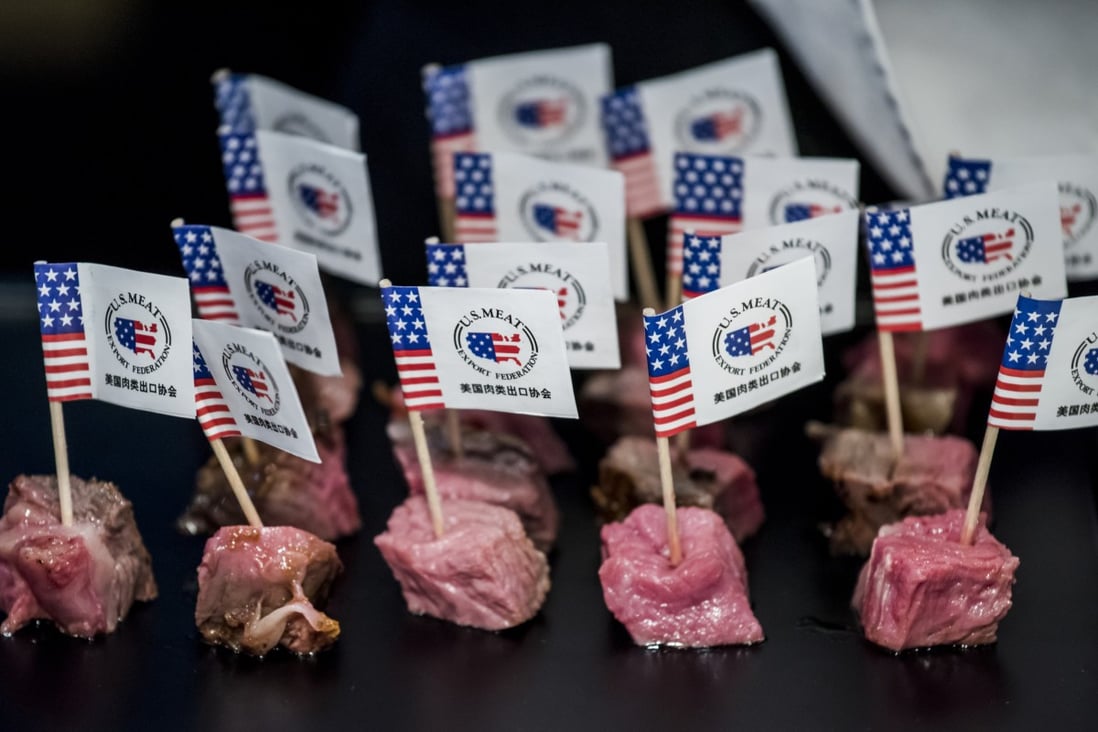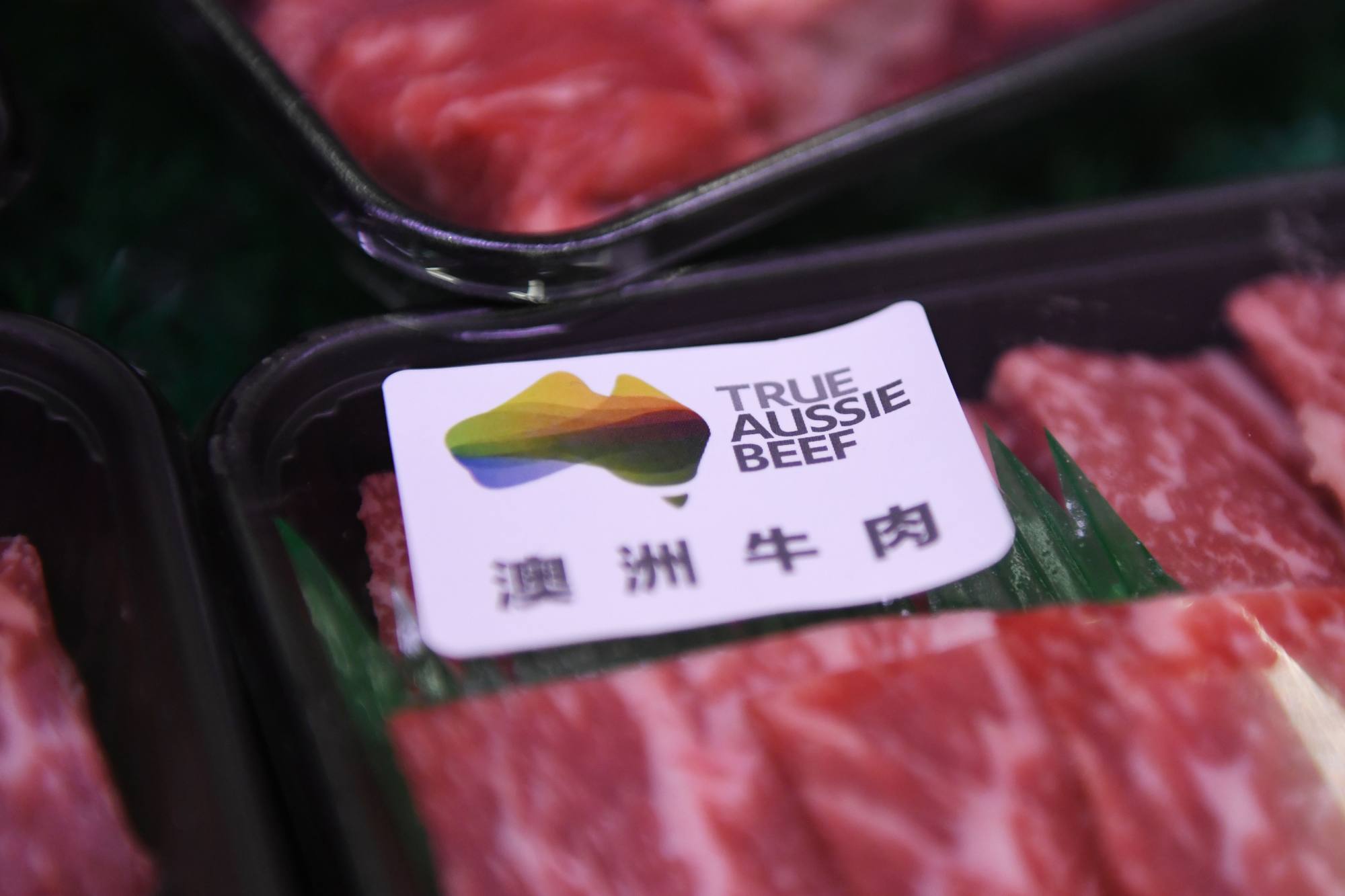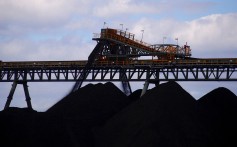Re <<compare modern Russia to modern China except for one man (de facto) rule>>
... I am doubtful that there is one-man-rule in either Russia or China. One-committee-rule is not one-man-rule.
In the meantime, appears that Team USA did rug-pull on Team Australia, and perhaps explains why Team Australia reset the China relationship since new government took over
Let us watch Germany
scmp.com
US beef exports to China surpass ‘loyal ally’ Australia, exposing downsides of cosying up to West
- The US sent 192,000 tonnes of beef to China in 2022, about 20 times more than annual exports just a few years ago and slightly ahead of Australia
- Beijing-Canberra tensions are partly to blame for the loss of market share, though experts say it’s also the price of American security guarantees
Published: 8:30am, 10 Mar, 2023

US flags and branding are seen on samples of America beef in Beijing. Photo: AFP
For the first time, the United States exported more beef to China last year than its ally Australia, annual trade data shows – a consequence of both the trade war between the world’s two largest economies and heightened Beijing-Canberra tensions in recent years.
Australia’s annual exports to China of frozen and chilled beef products were about 185,000 tonnes in 2022, but it was just beaten by the US with around 192,000 tonnes of beef exports across chilled, frozen and offal products.
That’s a marked increase on the 6,000 to 10,000 tonnes of beef the US exported to China annually in 2018-2019, before the first phase of a trade war deal was signed that forced Beijing to import more American goods. The US’s foray into the Chinese market picked up pace in 2020 and its exports were neck-and-neck with Australia in 2021.

Australian beef for sale at a supermarket in Beijing in 2020. Australia exported about 300,000 tonnes of beef to China in 2019 before trade measures were imposed. Photo: AFP
US annual exports to China of wine and cotton have also exceeded Australia’s. All three products, and more besides, were the target of trade measures Beijing unofficially imposed in 2020 after Canberra called for an investigation into the origins of the coronavirus, crumbling relations.
“After all these trade measures were put up, the Americans kept saying they had our back, that they were standing firm with us but they are selling more wine, more beef,” Geoff Raby, a former Australian ambassador to China, told This Week in Asia. “So much for the loyal ally.”
Raby said the government of ex-Prime Minister Scott Morrison, ousted in polls last May, had sought support for an international probe into the pandemic as a way of cosying up to Washington amid an already deteriorating relationship with Beijing.
Aside from being directly affected by the trade war, Canberra’s desire to stand with Washington could make Australia an indirect casualty of US-China competition, said Raby, who is now a non-executive director of coal miner Yancoal.
“Morrison unilaterally comes out and calls for an international investigation of the cause [of the pandemic] precisely at the time [former US President Donald] Trump is pounding the Chinese about the coronavirus, at probably the moment of the most intense attack by the US on China,” Raby said. “And so China retaliates with trade measures.”
China is one of Australia’s biggest export markets. In 2019, Australia exported just over 300,000 tonnes of beef to China, before informal Chinese trade measures such as suspensions on imports from specific Australian abattoirs occurred over the course of 2020. Exports were also affected by other factors including lower beef production caused by a seasonal rebuilding of herds.
‘Progress being made’
Improved relations since last year’s change of government in Canberra had raised hopes among Australian exporters that some of the import bans may now be lifted. Current Prime Minister Anthony Albanese said this week that the Australia-China relationship “has got more stable” and he would visit Beijing if invited.
Australian Trade Minister Don Farrell said on Thursday in an interview with state broadcaster ABC that “in almost every aspect where we’ve had trade blockages or disputes there appears to be progress being made”.
But he seemed to admit that this has yet to trickle down much to the country’s exporters when he added that his “job is to convert those discussions into practical outcomes for Australian businesses”.
You can say that … American security guarantees against China [are] sometimes implicitly paid for by surrendering export market share to politically powerful US exporters Jacob Kirkegaard, Peterson Institute for International Economics In the meantime, Raby said Australia should “on principle” question the US over its lost market share, particularly in relation to the trade war.
This was not the result of “free market outcomes” but trade diverted for political reasons, according to Jacob Kirkegaard, a senior fellow at the Peterson Institute for International Economics, who said Australia could feel justifiably aggrieved.
Australian exporters rekindle China ties amid diplomatic thaw
27 Feb 2023

“However, since Australia clearly desires to remain close to the US, it seems highly unlikely that Canberra will raise this issue politically with the Biden administration,” he said.
“As such, you can say that … American security guarantees against China [are] sometimes implicitly paid for by surrendering export market share to politically powerful US exporters.”
A return to form?
Though he agreed that the US-China trade war pact had undoubtedly had the effect of increasing US market share, Stephen Olson, a former trade negotiator and senior research fellow at the Hinrich Foundation, said Australian officials didn’t have a legitimate “complaint” as all countries compete to increase their export competitiveness.
“The purchase commitments contained in the phase one agreement were an unusually blunt mechanism to achieve this objective, but conceptually, it is understood that this is the goal of the game,” he said.
Still, geopolitical shifts could turn things around, Olson said, pointing to recent improvements in bilateral relations.
Australian exports to China could once again overtake the US in product categories where they competeStephen Olson, former trade negotiator
“With US-China trade and diplomatic relations seemingly going from bad to worse, Australian exports to China could once again overtake the US in product categories where they compete,” he said.
Australia could also benefit from a ban on beef exports to China that Brazil self-imposed last month, said Andrew Smith, head of agribusiness development at Australia’s Rural Bank.
“This could mean China will look for alternatives and likely will increase its month-on-month imports of Australian beef should the import ban on Brazilian beef continue,” he said.
Brazilian officials on Tuesday said they expected beef exports to resume within days as they had requested a revision of the protocol that triggered the ban, imposed after a case of mad cow disease was found in the northern state of Para in compliance with a bilateral sanitary agreement signed with China in 2015.
Smith said the US may also reduce beef exports later this year as producers look to rebuild herds, which would give Australian exports an edge in Chinese and other Asian markets.
Additional reporting by Reuters |




